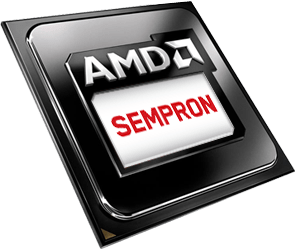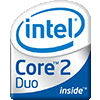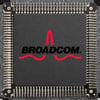
AMD Sempron 3850 Benchmark, Test and specs
Last updated:
The AMD Sempron 3850 has 4 cores with 4 threads and is based on the 1. gen of the AMD Sempron series. The processor uses a mainboard with the AM1 socket and was released in Q2/2014. The AMD Sempron 3850 scores 170 points in the Geekbench 5 single-core benchmark. In the Geekbench 5 multi-core benchmark, the result is 606 points.

| Name: | AMD Sempron 3850 |
|---|---|
| Family: | AMD Sempron (2) |
| CPU group: | AMD Sempron 2000/3000 (2) |
| Architecture: | Kabini (Jaguar) |
| Segment: | Desktop / Server |
| Generation: | 1 |
| Predecessor: | -- |
| Successor: | -- |
CPU Cores and Base Frequency
The AMD Sempron 3850 has 4 CPU cores and can calculate 4 threads in parallel. The clock frequency of the AMD Sempron 3850 is 1.30 GHz. The number of CPU cores greatly affects the speed of the processor and is an important performance indicator.
| CPU Cores / Threads: | 4 / 4 |
|---|---|
| Core architecture: | normal |
| Cores: | 4x |
| Hyperthreading / SMT: | No |
|---|---|
| Overclocking: | No |
| Frequency: | 1.30 GHz |
| Turbo Frequency (1 Core): | -- |
| Turbo Frequency (4 Cores): | -- |
Internal Graphics
The AMD Sempron 3850 has integrated graphics, called iGPU for short. Specifically, the AMD Sempron 3850 uses the AMD Radeon HD 8280, which has 128 texture shaders and 2 execution units. The iGPU uses the system's main memory as graphics memory and sits on the processor's die.
| GPU name: | AMD Radeon HD 8280 |
|---|---|
| GPU frequency: | 0.45 GHz |
| GPU (Turbo): | No turbo |
| Compute units: | 2 |
| Shader: | 128 |
| Hardware Raytracing: | No |
| Release date: | Q2/2013 |
| Max. displays: | 2 |
|---|---|
| Generation: | 5 |
| Direct X: | 11.1 |
| Technology: | 28 nm |
| Max. GPU Memory: | 2 GB |
| Frame Generation: | No |
Hardware codec support
A photo or video codec that is accelerated in hardware can greatly accelerate the working speed of a processor and extend the battery life of notebooks or smartphones when playing videos.
| h265 / HEVC (8 bit): | No |
|---|---|
| h265 / HEVC (10 bit): | No |
| h264: | Decode |
| VP8: | No |
| VP9: | No |
| AV1: | No |
|---|---|
| AVC: | Decode |
| VC-1: | Decode |
| JPEG: | Decode / Encode |
Memory & PCIeThe processor can use up to 8 GB memory in 1 (Single Channel) memory channels. The maximum memory bandwidth is 12.8 GB/s. The memory type as well as the amount of memory can greatly affect the speed of the system. |
|
| Memory type: | Memory bandwidth: |
|---|---|
| DDR3L-1600 | 12.8 GB/s |
| Max. Memory: | 8 GB |
| Memory channels: | 1 (Single Channel) |
| ECC: | No |
| PCIe: | 2.0 x 4 |
| PCIe Bandwidth: | 2.0 GB/s |
Thermal ManagementThe thermal design power (TDP for short) of the processor is 25 W. The TDP specifies the necessary cooling solution that is required to cool the processor sufficiently. The TDP usually gives a rough idea of the actual power consumption of the CPU. |
|
|---|---|
| TDP (PL1 / PBP): | 25 W |
| TDP (PL2): | -- |
| TDP up: | -- |
| TDP down: | -- |
| Tjunction max.: | 90 °C |
Technical details
The AMD Sempron 3850 is made in 28 nm. The smaller the manufacturing process of a CPU, the more modern and energy-efficient it is. Overall, the processor has 2.00 MB cache. A large cache can greatly speed up the processor's speed in some cases such as games.
| Technology: | 28 nm |
|---|---|
| Chip design: | Monolithic |
| Socket: | AM1 |
| L2-Cache: | 2.00 MB |
| L3-Cache: | -- |
| AES-NI: | Yes |
| Operating systems: | Windows 10, Linux |
| Virtualization: | AMD-V |
|---|---|
| Instruction set (ISA): | x86-64 (64 bit) |
| ISA extensions: | SSE4a, SSE4.1, SSE4.2, AVX |
| Release date: | Q2/2014 |
| Release price: | 30 $ |
| Part Number: | -- |
| Documents: | Technical data sheet |
Rate this processor
Benchmark results

The benchmark results for the AMD Sempron 3850 have been carefully checked by us. We only publish benchmark results that have been created by us or that have been submitted by a visitor and then checked by a team member. All results are based on and fullfill our benchmark guidelines.
Geekbench 5, 64bit (Single-Core)
Geekbench 5 is a cross plattform benchmark that heavily uses the systems memory. A fast memory will push the result a lot. The single-core test only uses one CPU core, the amount of cores or hyperthreading ability doesn't count.

|
AMD A4-5000
4C 4T @ 1.50 GHz |
||

|
Intel Atom Z3735E
4C 4T @ 1.83 GHz |
||

|
Intel Celeron E1200
2C 2T @ 1.60 GHz |
||
|
|
AMD Sempron 3850
4C 4T @ 1.30 GHz |
||

|
Intel Atom E3827
2C 2T @ 1.75 GHz |
||
|
|
HiSilicon Kirin 655
8C 8T @ 2.12 GHz |
||

|
MediaTek Helio P35
8C 8T @ 2.30 GHz |
||
Geekbench 5, 64bit (Multi-Core)
Geekbench 5 is a cross plattform benchmark that heavily uses the systems memory. A fast memory will push the result a lot. The multi-core test involves all CPU cores and taks a big advantage of hyperthreading.

|
Apple A8
2C 2T @ 1.50 GHz |
||

|
Intel Celeron 1017U
2C 2T @ 1.60 GHz |
||

|
Intel Core2 Duo E4600
2C 2T @ 2.40 GHz |
||
|
|
AMD Sempron 3850
4C 4T @ 1.30 GHz |
||

|
Intel Pentium T4500
2C 2T @ 2.30 GHz |
||

|
Intel Celeron E3300
2C 2T @ 2.50 GHz |
||

|
Raspberry Pi 4 B (Broadcom BCM2711)
4C 4T @ 1.50 GHz |
||
Geekbench 6 (Single-Core)
Geekbench 6 is a benchmark for modern computers, notebooks and smartphones. What is new is an optimized utilization of newer CPU architectures, e.g. based on the big.LITTLE concept and combining CPU cores of different sizes. The single-core benchmark only evaluates the performance of the fastest CPU core, the number of CPU cores in a processor is irrelevant here.

|
AMD Sempron 2650
2C 2T @ 1.45 GHz |
||

|
Intel Celeron N3000
2C 2T @ 2.08 GHz |
||

|
Intel Celeron J1850
4C 4T @ 2.00 GHz |
||
|
|
AMD Sempron 3850
4C 4T @ 1.30 GHz |
||

|
AMD GX-212JC
2C 2T @ 1.40 GHz |
||

|
Intel Atom x5-Z8350
4C 4T @ 1.92 GHz |
||

|
Intel Atom E3845
4C 4T @ 1.91 GHz |
||
Geekbench 6 (Multi-Core)
Geekbench 6 is a benchmark for modern computers, notebooks and smartphones. What is new is an optimized utilization of newer CPU architectures, e.g. based on the big.LITTLE concept and combining CPU cores of different sizes. The multi-core benchmark evaluates the performance of all of the processor's CPU cores. Virtual thread improvements such as AMD SMT or Intel's Hyper-Threading have a positive impact on the benchmark result.

|
Intel Celeron 1017U
2C 2T @ 1.60 GHz |
||

|
Intel Celeron J1850
4C 4T @ 2.00 GHz |
||

|
Intel Celeron N2930
4C 4T @ 2.16 GHz |
||
|
|
AMD Sempron 3850
4C 4T @ 1.30 GHz |
||

|
Intel Celeron N2920
4C 4T @ 2.00 GHz |
||

|
Intel Atom Z3795
4C 4T @ 1.59 GHz |
||

|
Intel Core i3-2365M
2C 4T @ 1.40 GHz |
||
iGPU - FP32 Performance (Single-precision GFLOPS)
The theoretical computing performance of the internal graphics unit of the processor with simple accuracy (32 bit) in GFLOPS. GFLOPS indicates how many billion floating point operations the iGPU can perform per second.

|
Qualcomm Snapdragon 450
Qualcomm Adreno 506 @ 0.60 GHz |
||

|
Samsung Exynos 5430
ARM Mali-T628 MP6 @ 0.60 GHz |
||

|
Samsung Exynos 5800
ARM Mali-T628 MP6 @ 0.60 GHz |
||
|
|
AMD Sempron 3850
AMD Radeon HD 8280 @ 0.45 GHz |
||

|
AMD GX-217GA
AMD Radeon HD 8280 @ 0.45 GHz |
||

|
AMD E2-3800
AMD Radeon HD 8280 @ 0.45 GHz |
||

|
AMD E2-3000
AMD Radeon HD 8280 @ 0.45 GHz |
||
Estimated results for PassMark CPU Mark
Some of the CPUs listed below have been benchmarked by CPU-monkey. However the majority of CPUs have not been tested and the results have been estimated by a CPU-monkey’s secret proprietary formula. As such they do not accurately reflect the actual Passmark CPU mark values and are not endorsed by PassMark Software Pty Ltd.

|
Intel Pentium E6800
2C 2T @ 3.33 GHz |
||

|
Intel Celeron N3160
4C 4T @ 2.24 GHz |
||

|
Intel Pentium 3805U
2C 2T @ 1.90 GHz |
||
|
|
AMD Sempron 3850
4C 4T @ 1.30 GHz |
||

|
Intel Pentium E5800
2C 2T @ 3.20 GHz |
||

|
Intel Core i3-3217UE
2C 4T @ 1.60 GHz |
||

|
Intel Core2 Duo E7600
2C 2T @ 3.06 GHz |
||
Benchmarks

Geekbench 5 (SC)
2,488 entries
2,488 entries

Geekbench 5 (MC)
2,461 entries
2,461 entries

Geekbench 6 (SC)
1,754 entries
1,754 entries

Geekbench 6 (MC)
1,702 entries
1,702 entries

FP32 SP (iGPU)
2,026 entries
2,026 entries

PassMark CPU-Mark
2,391 entries
2,391 entries

Geekbench 3 (SC)
942 entries
942 entries

Geekbench 3 (MC)
938 entries
938 entries
Popular comparisons
back to index







